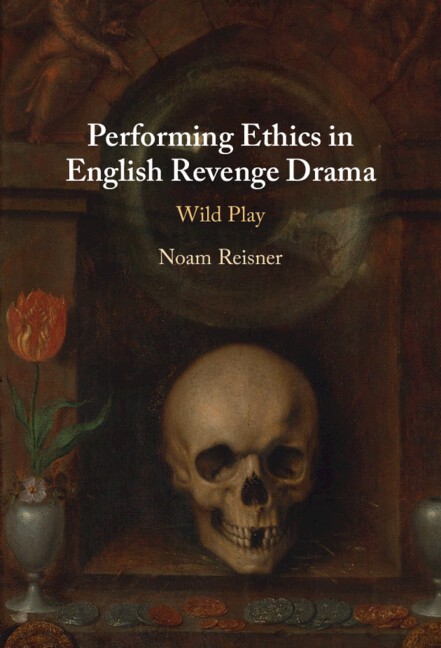
Performing Ethics in English Revenge Drama: Wild Play seeks to demonstrate that the overwhelming popularity of revenge drama in the English Renaissance is best understood in the context of the unique ethical effects it generates in its intended audience during a putative performance. Adapting Francis Bacon’s notion of revenge as a ‘kind of wild justice’, this study shows how English Renaissance revenge drama takes the form of ‘wild play’ in an attempt to reconcile performatively the deep tension in the period between practical ethics and abstract moral-religious principles. The obsession in Renaissance England with the theatre of revenge is widely recognised today as a salient feature of the period’s culture, but despite key studies on the subject, these plays’ unique modes of theatricality remain largely unexplored. This study argues for the emergence of ‘mimetic ethical exercises’ in English Renaissance revenge drama that are unique to these plays and define their theatrical experience. Such mimetic ethical exercises draw on complicated modes of audience participation in allowing an audience to test in real performance time, or what is sometimes referred to as the ‘event’ of the play, how abstract moral concepts normally extolled as ideals and virtues play out in a performative arena of human action.
Performing Ethics surveys a range of revenge plays from the period’s commercial theatre, beginning with Kyd’s The Spanish Tragedy and tracking the development of similar plays responding to Kyd’s original design in late Elizabethan and early Jacobean drama. In the process, it also provides a stage history of Kydian revenge drama with fresh readings of select plays by Marlowe, Shakespeare, Marston, Middleton and other early Jacobean playwrights. The study combines a close reading of these plays with theoretical perspectives drawn from the study of ethics and moral philosophy, as well as metatheater and the study of early modern theatricality and audience participation. It aims to show how the popular revenge plays of the era were the site of an intense and radically destabilising debate about the complex relationship between performance, mimetic representation, and violence in a society where abstract moral and religious ideas often came into conflict with the practical ethics of everyday life. The empty stage spaces in these plays, evicted of their moral content but nevertheless framed by moral ideas, allow for the audience to explore productively with the onstage characters various mimetic ethical exercises about the choices we make in the face of excessive and unspeakable suffering.
Performing Ethics shows that Kydian revenge plays on the English Renaissance stage were not merely gratuitous theatrical displays of excessive cruelty and violence but were deeply engaged with probing the limits of violence itself and its meaning to individuals caught in the period’s most vexed religious-moral crises. Equally, however, the plays in this tradition do not merely point thematically to areas in the culture that are ill-defined legally or morally or explore a particular cultural anxiety in thematic terms. Rather, these are plays that actively generate in their audience moral disorientation which allows for the enactment of a variety of mimetic ethical exercises as part of the dramatic experience itself. These exercises, in turn, instead of just or only rehearsing moral platitudes in abstraction, allow for the dramatisation of difficult ethical questions about causality and contingency, punishment and proportionality, restraint or forbearance, and finally about the self-indulgence of the theatrical spectacle itself, and its underlying ethics and aesthetics of excess and repetition.
In its exploration of the ‘wild play’ of Kydian revenge drama on the Renaissance English stage, this study engages with more than just a historical survey of contemporary drama about revenge, or, for that matter, with the idea of revenge itself. That is, it recognises that revenge is not merely a theme with which a given play may engage morally in remote ways but an operative ethical problem in our daily life that calls for unique negotiation of its excessive terms, often enough in histrionic or dramatic terms. The age-old theatrical metaphor of acting as ethical engagement with the world along the axis of the theatrum mundi cliché receives, therefore, in these plays a unique inflexion about the sort of ‘actions a man might play,’ as Hamlet famously puts it, when faced by impossible moral binds. At their deepest levels, these remarkable plays teach us much about the nature of revenge acts as a superfluous destructive reaction to the many real and imagined injustices anyone might feel outraged about throughout one’s life.
More Importantly, in mapping the stage business of these plays onto the emerging crisis in moral thought and praxis in the period, it soon emerges that these plays can also teach us much about the limits of moral thought itself, especially when a moral idea is pursued as an uncompromising ideal for its own sake. The violence of revenge in general, and of English Renaissance revenge drama especially, is such that no amount of moral suppression as law and interdiction can ameliorate. On the contrary, these plays expose the violence inherent in religious, moral thought itself, which would seek to deny certain ethical lived experiences as morally vital when having to place a necessary limit on the rapacious cycle of retaliatory violence in any given society. One surprising consequence, therefore, of this study is the manner by which many of the playwrights in question, in rethinking Kyd’s original dramatic idea, show that only the intervention of interpersonal love and dignity can place a possible limit to the exponential violence of revenge. It reveals that Kyd and the playwrights that followed in his footsteps, including Shakespeare, were keenly aware that the ideological instinct to make sense of the world by appealing to large master narratives and moral ideas that precisely eradicate the individual subject and her desire in the world is deeply flawed. Kydian revenge drama emerges in this light as uniquely radical and, therefore, in a profound sense, perennially modern and relevant to our present times, which are precisely beset everywhere by the unbridled violence of ideology.

Performing Ethics in English
Revenge Drama by Noam Reisner
Latest Comments
Have your say!